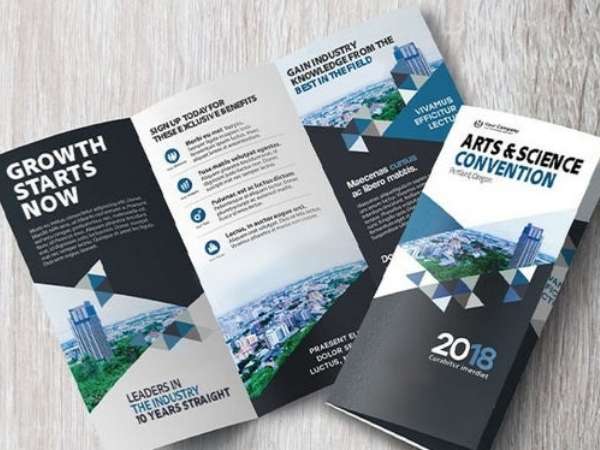About Brochure Design
Time:2024-10-29
Views:199
Designing a brochure that is worth keeping is a challenging feat. An effective brochure should not only convey information and be eye-catching but should also resonate and leave a lasting impression. So, how do you make a brochure that is worth keeping? In this article, we’ll explore the various 12 elements that you need to consider for effective brochure design.

Things to Consider for an Effective Brochure Design
1. Determine your purpose.
Before getting into brochure design, the first step is identifying your brochure’s objectives. Are you targeting a specific demographic? Will it be distributed by hand or sent through direct mail? What results do you hope to achieve? Answering these questions can help determine the direction of your brochure marketing so that you can easily choose which design to go for.
2. Know your brochure folds.
Brochures are known for a lot of various folds, and these help you manage how your product and service information are presented. When choosing the right brochure fold, you’d want a style that complements your content, something that makes it easier for your recipients to read your material. For example, a list of product features or a step-by-step procedure may benefit more from a trifold or roll fold brochure as these are ideal in revealing sequences.
3. Review your copy.
The content of a brochure is crucial, as is how you present or convey that information. Ensure that your copy is concise, understandable, and straightforward. Too much information can overwhelm your readers and could leave them uninterested. Check for spelling and grammar mistakes, and make sure your copy is attuned with the overall visual design.
4. Choose your fonts.
Fonts affect the readability of your text, set the tone of your brochure, and impact its overall visual appeal. Choose font combinations that match your brand identity, and ensure they are easy to read. Limit your font choices from two to a maximum of three and use these for the heading, subheading, and body text.
5. Know your paper stock and coating.
Familiarize yourself with the paper stock you’ll print your brochure on, as well as the coating that you can use to enhance it. Your choice of paper stock and coating can influence how customers perceive your company — brochures made with thicker paper stock and a glossy or matte coating will feel more sophisticated than those made with thinner variants.
Your choice of paper stock and coating will also affect durability. Heavier stock usually lasts longer than lighter ones, while coatings can protect your brochure from smudging and abrasions and make colors more vibrant.
6. Use high-resolution photos.
Image quality is crucial in effective brochure design. If you’re going with stock photos, use the ones that do not look generic and are appropriate for your brand. If you’re going to shoot product images, make sure that they are arranged in a visually appealing way, especially omnibus setups. Consider hiring a professional photographer to help you with art direction and in ensuring the quality of your product presentation. But if you plan to take the photos yourself, prepare by watching online tutorials on creating an ideal product photography setup, plan layouts, and rehearse techniques before the actual shoot.
7. Include a call-to-action.
The call-to-action is the most important section of your brochure. This is where you lead customers to act, whether it’s to buy your products, visit your website, or avail your discounts, so you have to be specific about what it says. Make your call-to-action immediately visible to your recipient by using a bigger font or larger white space around it to make it stand out. For better results, include an incentive for readers — things like coupons or exclusive promotions can encourage customers to act after reading your brochure.
8. Create an eye-catching headline and cover design.
Your brochure headline and cover design are the first things readers will see when they receive your brochure. Write a clear and eye-catching headline to go with an awesome cover design to draw attention and encourage people to read your brochure.
9. Maintain a balanced layout.
A balanced layout will not only look aesthetically pleasing, it will also make your content easier on the eyes. Give your readers a great visual treat by breaking down large blocks of text, using high-quality images, and avoiding distracting graphics that can make the layout look cluttered.
10. Pick your colors wisely.
Colors can instantly influence your readers and evoke certain emotions. Choose a color palette that is consistent with your brand’s theme and mix and match different shades until you achieve a scheme that will attract people to pick up your brochure.
11. Give your readers the option to engage.
In line with having a good call to action, ensure that your business information, such as your name, website, email address, phone number, and social media accounts, are present in your brochure. This will help readers reach out to you should they have any inquiries about your business or the products and services you offer.
12. Get creative.
Don’t be afraid to test various designs and combinations. Go the unconventional route and get creative in laying out your brochure. You can experiment with unique shapes, add inserts, or play around with the type of fold to make your brochure stand out when placed in the rack.
Creating an effective brochure design involves strategic planning, compelling content, and eye-catching visuals. With a well-designed brochure, you can elevate your brand and attract potential customers with ease.







